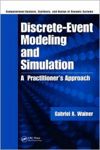Difference between revisions of "Main Page"
| Line 5: | Line 5: | ||
CD++ is a generic toolkit for Discrete-Event modeling and simulation. The environment is based on the DEVS (Discrete-Event systems Specifications) formalism. | CD++ is a generic toolkit for Discrete-Event modeling and simulation. The environment is based on the DEVS (Discrete-Event systems Specifications) formalism. | ||
| − | |||
This Wiki is focused on the toolkit itself, and in tool-related aspects. Readers interested in the underlying theory should consult: | This Wiki is focused on the toolkit itself, and in tool-related aspects. Readers interested in the underlying theory should consult: | ||
Revision as of 11:04, 25 August 2011
|
Introduction to CD++
CD++ is a generic toolkit for Discrete-Event modeling and simulation. The environment is based on the DEVS (Discrete-Event systems Specifications) formalism.
- B. Zeigler, H. Praehofer, T. G. Kim. “Theory of Modeling and Simulation”. 2nd Edition. Academic Press. 2000. - G. Wainer. Discrete-Event Modeling and Simulation: a practitioner's approach (book). The Introduction page contains further information and references on DEVS and Cell-DEVS. You can find several publications here. You can find some teaching and learning materials about DEVS and Cell-DEVS in this course webpage.
|
